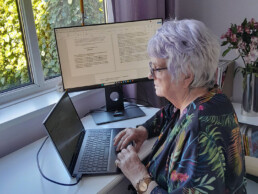Oracy: Is that All it Is?
For those of us who were teaching in state school classrooms in 1989 and beyond, the introduction of the original National Curriculum for England came as a total shock. We were in no way prepared for it. We received no helpful training or induction. Colleagues working for Local Authorities appeared to be only a short paragraph ahead of us in their understanding.
As a head of English in a middle school, I naturally focused my initial energies on the curriculum for English, with its three distinct sections; AT1: Speaking and Listening, AT2: Reading and AT3: Writing. I found, as did many others, that the Speaking and Listening said little, expected less and interested no-one. It stood alone, in isolation.
I was, however, extremely fortunate to be invited to take part, with our pupils and staff, in the National Oracy Project – with its wealth of materials and resources – piloted from 1987 to 1993 to support the development of speaking and listening skills. This re-enforced my career-long passion for the priority of oracy in education and pupils’ future lives. However, my move to primary in 1990 to become assessment lead led to my embracing the entire curriculum, except for English AT1.
In 2013, the revised National Curriculum renamed AT1 ‘Spoken Language’ but its introduction still maintained clear separation between the two most integral skills of oracy. I quote:
The quality and variety of language that pupils hear and speak are vital for developing their vocabulary and grammar and their understanding for reading and writing. Teachers should therefore ensure the continual development of pupils’ confidence and competence in spoken language and listening skills.
Is THAT all it is?
This revised English curriculum takes up almost half of the entire National Curriculum for Key Stages 1 and 2 with its 11 intrinsic subjects and 4 associated subjects, and yet – after just over a side on Spoken Language for all of Key Stages 1 and 2 – it is almost entirely devoted to spelling, grammar and punctuation rules. And thus, the National Curriculum has persisted in paying lip-service to the crucial skills of oracy by refusing to acknowledge the need to embed the two skills as one for children’s learning and development.
Indeed, the world of education failed to truly embrace the creation of the concept when it was first developed by Andrew Wilkinson in the 1960s. He created the name ‘oracy’ by analogy from the terms ‘literacy’ and ‘numeracy’.
Wilkinson executed this revolutionary perspective in response to the perceived neglect of the skills of oral communication in education 64 years ago – and it has only recently been discovered by the majority of the world of education in this millennium.
According to Wilkinson’s conceptualization, oracy in educational theory is the fluent, confident, and correct use of the standard spoken form of one’s native language. It also established a standard where students’ abilities are developed within an integrated program of speaking and listening, reading and writing. Recent studies also equate oracy with the notion of “talking to learn” within the perspective that knowledge is constructed by the individual knower, through an interaction between what is already known and new experience. An example of oracy-based education initiative was the UK’s National Oracy Project, which recognized the role played by classroom talk and put equal treatment between spoken and written modes. (Wikipedia)
In The Concept of Oracy (1970) Wilkinson says that, when asked to qualify ‘oracy’ in only three words, he defined it as the ‘verbalisation of experience’ – expressing our own experiences and ideas, but was never satisfied that covered all bases until he realised he could re-order the words: ‘the experience of verbalisation’ – listening to the experiences and ideas of others. I agree with him that the two definitions together paint the whole picture.
Listening is intrinsic to speaking – the two should never be separated conceptually. The child learns to speak through hearing speech, subject to speaking and listening ability:
- The more the parent/s or carers of a young child talk with that child, the more the child will talk.
- The wider the vocabulary that same adult uses, the wider the vocabulary the child understands and eventually uses.
- The more often a word is repeated in a range of contexts, the better the child will understand and embed it.
- If the adult who talks to the child for most or all of its first years, talks with a local accent, the child will talk with a local accent.
- If the adult talks in dialect, the child will talk in dialect.
- If the adult talks in Standard English (correct grammar and pronunciation) the child will talk in Standard English.
- If the adult talks in received pronunciation, the child will talk in received pronunciation.
- If the adult uses dialogic constructions in language, the child will use dialogic constructions.
These are facts, simple and clear. If we want children to be competent and confident speakers, presenters, writers and debaters, we MUST fill their lives with these models through constant exposure and active participation in oracy.
The ability to adapt speech for purpose is a strength, not a weakness. Being able to code switch into local accent or dialect is not a negative, as long as it is a choice and not the only form the individual has.
The English-Speaking Union was founded in 1918 by Sir Evelyn Wrench, with the aim of English-speaking democracies working together to build international fellowship and, ultimately, peace. It now devotes the majority of its work to developing young people’s skills of oracy in schools around the world. This organisation defines the skills of oracy as having four components:
- Reasoning and Evidence
- Organisation and Prioritisation
- Listening and Response
- Expression and Delivery
I found this inspirational; these are the skills of debate and presentation. THIS is oracy, the ability to not only speak, but to adapt speech, selecting and refining – and ultimately to write if that is the goal – for audience and purpose. Remember my historic maxim? If a child can’t say it, a child can’t write it. A reasoned argument for ‘A’ Level or for a Doctorate is seeded at the adult’s knee in the first seven years of life, and it blossoms (or not) and grows as that child moves through education.
In his letter to the Secretary of State, 30th September 2020, Robin Alexander (University of Cambridge: ‘Improving oracy and classroom talk in English schools: achievements and challenges’) presents six propositions:
-
We have known for a long time that talk is essential to children’s thinking and learning, and to their productive engagement in classroom life, especially in the early and primary years. We now have additional evidence, from over 20 major international studies, that high quality classroom talk raises standards in the core subjects as typically measured in national and international tests.
-
There can no longer be any doubt that oracy should feature prominently within the statutory national curriculum.
-
We need a different kind of talk from teachers in order to extend the repertoire of pupil talk and raise the standard and cognitive impact of classroom talk overall.
-
Though the terms ‘speaking and listening’ and ‘communication skills’ indicate objectives of indisputable educational significance, they have become devalued by casual use and should be replaced by terms that signal the emphatic step change in thinking and practice that is needed. ‘Oracy’ is a neologism which some find unappealing; ‘spoken language’ fits the bill reasonably well, though it doesn’t have the connotation of acquired skill that, by analogy with literacy, ‘oracy’ possesses.
-
There is a strong case for revisiting the 1975 Bullock Report’s advocacy of ‘language across the curriculum’ in order to underline the argument that educationally productive talk is the responsibility of all teachers, not just those who teach English.
-
Since this is about the quality of teaching as well as the content of the curriculum, it has implications not only for the NC review but also for initial teacher training, CPD, inspection and professional standards.
Alexander goes on to note that the ‘Cambridge Primary Review’ took the penultimate point further:
We recommend that in addition to the programmes of study of English, there should be a clear statement on language across the curriculum which requires attention in all subjects to the character, quality and uses of reading, writing, talk and ICT, and to the development of pupils’ understanding of the distinct registers, vocabularies and modes of discourse of each subject.
The Cambridge Dictionary defines oracy as:
the ability to speak clearly and grammatically correctly.
It is SO much more!
In my next blog I will exemplify one or two of the oracy activities I have seen embedded in lessons recently in schools.
Talk:Write
A fun and flexible approach to improving children’s vocabulary, speech, and writing.


